Sundae Monday
What would happen if we had Samuel L. Jackson as White House Press Secretary? Hmmm . . .
CineMathematics or CinemaThematics. Your choice
What would happen if we had Samuel L. Jackson as White House Press Secretary? Hmmm . . .
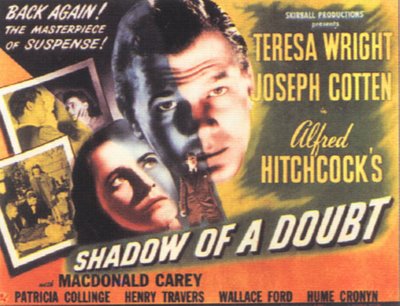
Note: This is my entry into The Film Experience Blog's Vampire Blog-A-Thon. You can check out the rest of the entries here. I guess this can also count as my entry into The Film Vituperatem's Hitchcock Blog-A-Thon, tough I plan to contribute more to that one as it comes. So until then, enjoy this vampirelicious take on Hitchcock.
Let's face it. Hitchcock isn't exactly one for the supernatural. But since I couldn't find a copy of
Jesus Christ Vampire Hunter, I decided to go with some vampiric imagery rather than a vampire film. And that is found in abundance within Shadow of a Doubt, yet another one of Hitchcock's true masterpiese. A close reading can show how vampire imagery is used to portray the "fall" that we all must take in order to see the world as it is.
Uncle Charles is shown as a vampire from the very first time we see him. The first shot where we see him is a fade through the window of his room, showing him laying on his bed with his arms crossed over his chest. He barely moves, except to blow smoke from his cigar. The landlady enters, and he can barely talk to her above a quiet monot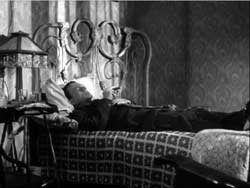 one droll. The landlady closes his shades, and he almost immediately becomes active. Only after he is enveloped in the darkness does he get up to examine the cops following him. Hitchcock has effectively set up this man as the personification of evil. He acts for no other purpose than to help himself, and he can only do this by draining others of their life forces. While normal vampires take a person's blood, Charles takes their money. He feeds on the widows, taking their lives and their money. It is the money that is continually emphasized. By stressing this connection between Charles and the embodiment of evil, Hitchcock forces us to examine how he is treated throughout the film. How does the world react to evil? And how does evil come about anyway?
one droll. The landlady closes his shades, and he almost immediately becomes active. Only after he is enveloped in the darkness does he get up to examine the cops following him. Hitchcock has effectively set up this man as the personification of evil. He acts for no other purpose than to help himself, and he can only do this by draining others of their life forces. While normal vampires take a person's blood, Charles takes their money. He feeds on the widows, taking their lives and their money. It is the money that is continually emphasized. By stressing this connection between Charles and the embodiment of evil, Hitchcock forces us to examine how he is treated throughout the film. How does the world react to evil? And how does evil come about anyway?
One of the major plot points in Shadow of a Doubt is Charles' inability to be photographed. Once again, this suggests that he is a vampire, but here we get a more in depth idea of how the vampirism works. We are shown a picture of Uncle Charles from when he is a child, the Christmas day he got a bicycle and almost got killed. Charles has fallen. After that point, his photograph is never taken again. The link to a vampire is once again employed, but here we have more to it than just that Charles is a vampire. We now have a time when he became a vampire. He fell, and so he is now the walking dead. The fall is used later in the film, when young Charlie learns the truth about her uncle. We see the fall happen, though Charlie doesn't actually stumble. She learns the truth at the public library, and in a moment of pure bravura filmmaking, Hitchcock focuses in on the ring which has revealed the truth to Charlie. Hitchcock shows the ring, and then he pulls back until the camera has been lifted to the point where Charlie is a small point in the frame. Charle has fallen, and we see the effects immediately.
For the entire next day, Charlie is asleep. She only wakes up when dinner is served. Charles is not the only vampire anymore. He has his niece to join him on the dark side. The day after this, we see church being let out, but Charles is nowhere to be found. In fact, we never see Charlie in the church, just outside of it after the service is over. It is at this point that we see Jack Graham and Mr. Saunders waiting for them to reveal their plan for potentially capturing Charles. Charlie approaches the two detectives with her sister Ann and friend Catherine. In order to tell Charlie about their plan alone, Graham suggests that Ann tells Catherine the story of Dracula. This can also serve as a warning to Catherine, whom we have seen giving lusty looks to Charles.
The warning is actually a double warning to Catherine. One is to stay away from Charles. But it's the other that sticks closer to the ongoing themes of the film. Catherine should stay away from her lascivious ways, or else she will become one of the "fallen." The idea of the fallen comes again after the warning, when Charles and Charlie enter the Til 2 Club.  Charlie has never been there before, and the waitress says she would never have imagined seeing Charlie there. That is because the Til 2 Club is for the lowlifes of the town, for those who have fallen from grace. The first time Charles tries to kill Charlie, it's by a broken step, where Charlie would have fallen to her death. But it's impossible not to fall. Everyone falls. Not only murderers like Charles, but normal people like Charlie. We are all like the walking dead, like vampires. Charles, the personification of evil, is lauded as a hero upon his death. If we are to make our way through the sea of evil, Hitchcock tells us we must first realize that we ourselves are evil. We are all vampires in one form or another.
Charlie has never been there before, and the waitress says she would never have imagined seeing Charlie there. That is because the Til 2 Club is for the lowlifes of the town, for those who have fallen from grace. The first time Charles tries to kill Charlie, it's by a broken step, where Charlie would have fallen to her death. But it's impossible not to fall. Everyone falls. Not only murderers like Charles, but normal people like Charlie. We are all like the walking dead, like vampires. Charles, the personification of evil, is lauded as a hero upon his death. If we are to make our way through the sea of evil, Hitchcock tells us we must first realize that we ourselves are evil. We are all vampires in one form or another.
So work has my going insane over here. I'll have something for the Vampire Blog-a-Thon, but other than that, I have too much crap to do. When I get back, I'll have thoughts on The Descent, Carrie, The Rules of the Game, The Earrings of Madame de ..., Sansho the Bailiff, and Day of Wrath. That's my weekend, or at least what I can make of it outside of my paper on Rebecca for my Hitchcock class. Now, if you'll excuse me, Sallust is calling my name.
This is going to (hopefully) a weekly feature, a tribute to that most delicious of desserts and that most annoying week beginnings. We'll start off with a great musical moment in the history of that greatest of shows, The Simpsons.
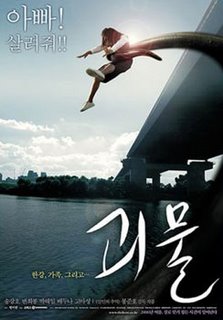 It's hard to say what hasn't been already been said about The Host. Yes, it's a phenomenal monster movie. Yes, it serves as a savage indictment of the way bureaucracy is unable to deal with most anything major in this modern world. I couldn't help but see a little bit of Hurricane Katrina in the portrayal of the government. But there was something else I realized at some point. The whole film is very Hitchcockian in its focus, and the ending strongly reminded me of The 39 Steps.
It's hard to say what hasn't been already been said about The Host. Yes, it's a phenomenal monster movie. Yes, it serves as a savage indictment of the way bureaucracy is unable to deal with most anything major in this modern world. I couldn't help but see a little bit of Hurricane Katrina in the portrayal of the government. But there was something else I realized at some point. The whole film is very Hitchcockian in its focus, and the ending strongly reminded me of The 39 Steps.It was 29 years ago today that the music world lost the heart of Lynyrd Skynyrd to a tragic plane accident. This one's for Ronnie.
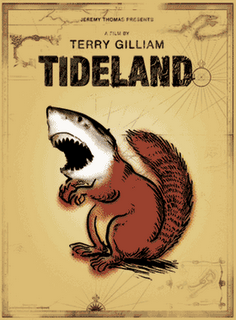 Don't believe what you've read about Tideland. The way it's being advertised, it's the same sort of film as Pan's Labyrinth, a tale of one girl's flight into her imagination to escape the horror's of real life, only to find that her imagination is just as dark. This is hardly the case. Tideland is the story of a girl in the prairie who lets her imagination run wild after her father has overdosed on heroine. Now, that may sound like what I just said it's not, so let me elaborate. There isn't any extensive quest through her imagination, only to realize that it was all a dream and everything's ok. This is not Time Bandits. The filghts of her imagination make up small parts of the film, depending on how you view the ending.
Don't believe what you've read about Tideland. The way it's being advertised, it's the same sort of film as Pan's Labyrinth, a tale of one girl's flight into her imagination to escape the horror's of real life, only to find that her imagination is just as dark. This is hardly the case. Tideland is the story of a girl in the prairie who lets her imagination run wild after her father has overdosed on heroine. Now, that may sound like what I just said it's not, so let me elaborate. There isn't any extensive quest through her imagination, only to realize that it was all a dream and everything's ok. This is not Time Bandits. The filghts of her imagination make up small parts of the film, depending on how you view the ending.This past evening marked the beginning of the 4th annualBoston Fantastic Film Festival. I will presonally be reporting on some of the films, namely Tideland and The Host. I'd see more of them, but I'm saving up for 50 Years of Janus Films.
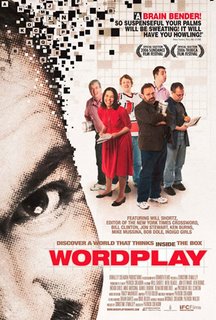 College life gives some opportunities that you can never get again, namely access to free newspapers. At Tufts I can get the Tufts Daily, the Daily Metro, and the New York Times. Now, not only do these fine pieces of journalism (well, some of them) offer insight into important affiars both local and globally, but they also gave me my first real chance to do crossword puzzles. How else can someone get through a 75 minute lecture on probability?
College life gives some opportunities that you can never get again, namely access to free newspapers. At Tufts I can get the Tufts Daily, the Daily Metro, and the New York Times. Now, not only do these fine pieces of journalism (well, some of them) offer insight into important affiars both local and globally, but they also gave me my first real chance to do crossword puzzles. How else can someone get through a 75 minute lecture on probability?I know I'm a little bit behind the times. Blogs are soooo however long ago they were. But who cares? I've wanted one so I can join the community of bloggers that allows for much more direct and interesting discussions on the world. Also, I figure I can improve my writing by working on it regularly. See, math people are not so good at writing. I hope that being someone with my background will allow me to add something different to the discussion.